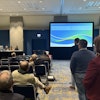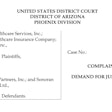A New Hampshire superior court judge has denied a motion to dismiss a lawsuit brought against the American Registry of Radiologic Technologists (ARRT) in the case of radiologic technologist David Kwiatkowski, who allegedly infected patients at Exeter Hospital with hepatitis C.
ARRT and three other entities, including Exeter Hospital, were named in the suit by a patient who was infected with the virus while being treated at Exeter. The plaintiff is suing ARRT for negligent certification and failure to disclose information to employers about a previous incident involving Kwiatkowski at a hospital in Arizona, according to a report on NewHampshire.com.
Kwiatkowski was arrested at Exeter in July 2012 and has been indicted on charges of infecting patients with hepatitis C by allegedly taking the anesthetic fentanyl, intended for patients undergoing interventional radiology procedures, and diverting it for his own use.
On January 23, Judge Kenneth McHugh of Rockingham County Superior Court denied ARRT's motion, writing that although ARRT claims it had no relationship to the plaintiffs and cannot be held liable for Kwiatkowski's actions, "presumably in the industry [ARRT certification means] something" -- if not to patients, to the hospitals that hire radiologic technologists -- and that ARRT's certification of Kwiatkowski enabled him to work at Exeter.
ARRT had time to investigate Kwiatkowski's behavior, according to McHugh: In April 2010 -- a year before Kwiatkowski was hired by Exeter Hospital -- he was involved in an incident at Arizona Heart Hospital in Phoenix that was reported to ARRT. The organization did not seek to revoke his credentials, citing lack of firsthand evidence, and did not conduct any further investigation, McHugh wrote. But the specifics of Kwiatkowski's behavior in Arizona were "easily discoverable" and "eerily similar to [his] conduct at Exeter Hospital," he wrote.
Exeter Hospital has also denied liability in the case, stating in a motion filed on January 9 that it acted "reasonably and responsibly, with appropriate regard for the health and safety of its patients, and in compliance with applicable standard of care," according to an article on Seacoastonline.com.
To hold a professional certifying organization such as ARRT liable for the actions of an individual it does not employ would represent a significant shift in the legal landscape governing ARRT and similar entities in healthcare, as well in as other professional fields, ARRT said in a statement.
"The legal actions following the charges against [Kwiatkowski] are in an early stage, with a great deal of discovery and other legal activity still pending," ARRT said. "We are confident the evidence will clearly show that ARRT conducted a reasonable investigation in this case, given the limits of its legal authority and administrative scope."




















